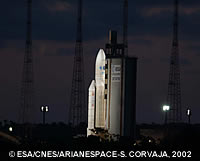Launch of weather monitoring satellite delayed
The launch of the first satellite to monitor the radiation balance of the entire western hemisphere was delayed on 27 August due to a technical problem. The Meteosat second generation satellite was due to be launched on the Ariane 5 rocket from French Guiana in South America late on 27 August. The countdown was stopped however when a problem was detected in the computer dialogue between the control centre and the launcher. The problem was corrected, but too late to launch the satellite on that day. A second attempt will be made on 28 August at 22.30 GMT. The satellite will provide weather forecasts and climate change predictions by measuring the flow of infrared radiation into and out of the Earth's atmosphere. Meteorologists will receive data every 15 minutes, allowing them to track short-lived weather systems and to understand how longer term effects emerge. When in position, the satellite will be nearly 36,000 km above Earth, just off the West coast of equatorial Africa. It will be operational from November. The satellite cost around 14 million euro to develop; it was financed mainly by the UK, Italy and Belgium and was a joint project of the European space agency and Eumetsat, the European weather satellite organisation.



